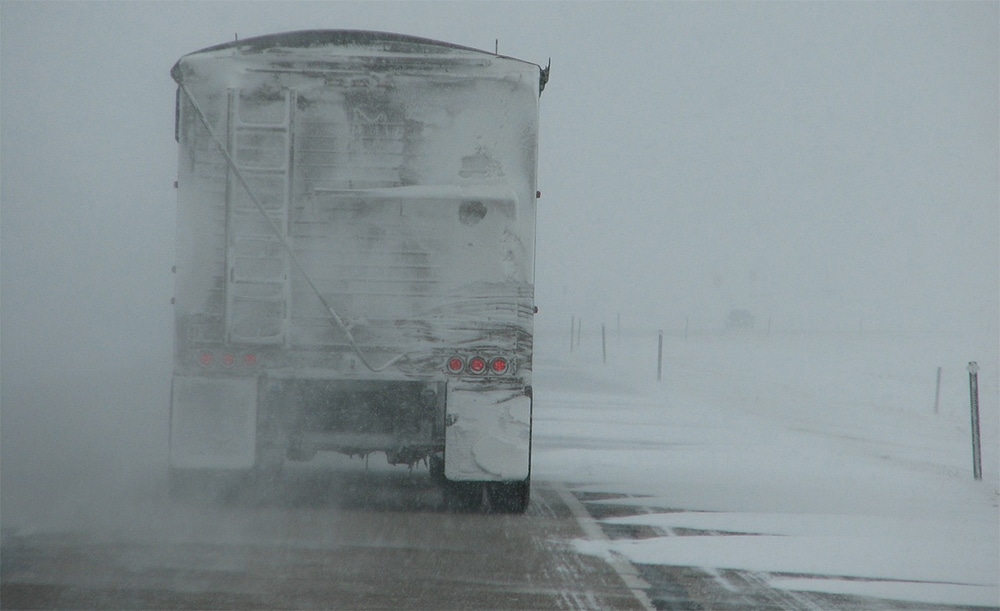Truck Accidents Involving Bad Weather

It takes a significant amount of skill and knowledge to safely drive tractor-trailers in even the safest driving conditions. When conditions are anything less than ideal, truckers must take extra care when sharing the road with other vehicles.
Unfortunately, even the safest and most experienced truck driver can still cause an accident—especially if the weather isn’t great.
Truck accidents involving bad weather can be especially severe, resulting in serious injuries and significant amounts of property damage. Bad weather doesn’t give truckers who cause crashes a free pass. Weather and poor driving conditions are not an excuse for negligence, and we should expect professional drivers to exercise even greater caution than usual when the weather is bad.
If you or a loved one was injured in a truck crash during a period of inclement weather and you want to learn about your legal options, contact Pittman Roberts & Welsh, PLLC. We’ll make sure you understand what your rights are in this situation.
Bad Weather That Can Cause Truck Accidents
Mississippi residents are no strangers to bad weather. While we average less than one inch of snow per year, the Magnolia State still sees its fair share of serious weather events, including rainstorms, sleet, freezing rain, fog, high-speed winds, tornadoes, hurricanes, high temperatures, and more.
According to the U.S. Department of Transportation Federal Highway Administration (FHA), poor weather is a significant contributing factor for motor vehicle accidents, accounting for around 21% of all crashes. That’s approximately 1,235,000 weather-related collisions a year.
The most dangerous adverse driving conditions, according to FHA data, are:
- Wet roads
- Rain
- Sleet or snow
- Icy roads
- Slush or snow-covered roads
- Fog
These weather conditions are even more dangerous for trucks than they are for smaller passenger vehicles. Rain, sleet, and ice all decrease traction between vehicle tires and the pavement, increasing the time and distance required to come to a full and complete stop.
Braking times for 18-wheelers and other large commercial vehicles (CMVs) are already longer than they are for standard passenger vehicles. When traveling at 55 mph on dry pavement in ideal conditions, a fully-loaded tractor-trailer needs 196 feet of stopping distance. Anything that makes roads slippery or decreases friction will increase stopping distances and times. If a truck driver isn’t prepared to account for adverse driving conditions, it is possible that a preventable accident will occur.
How Drivers Can Travel Safely During Periods of Poor Weather
During bad weather or periods of poor visibility, truck drivers should make careful, concerted efforts to limit their risk of causing an accident. Actions that can preserve the safety of everyone on the road include:
- Doubling following distances
- Reducing driving speeds
- Turning on headlights when raining (even during the day)
- Using low beams in fog
- Avoiding standing water
- Pulling over
Truck drivers should also plan ahead every time they get behind the wheel.
This includes ensuring that all equipment is functioning as intended during the pre-trip inspection and checking the weather conditions of the planned driving route. If any equipment appears to be damaged or in need of repair, it must be fixed prior to departure. A truck driver can also plan an alternate route if weather forecasts along the current route are expected to involve dangerous conditions.
If you are behind the wheel of a smaller passenger vehicle and the weather or driving conditions are poor, do your best to keep a safe distance from 18-wheelers and other large vehicles. If necessary, pull over at a safe location and wait until driving conditions have improved.
The FMCSA Adverse Driving Conditions Exception
The Federal Motor Carrier Safety Administration (FMCSA) is the government agency responsible for regulating the trucking industry.
The hours-of-service (HOS) regulations limit how long a driver can be on duty, how many of those hours can be spent behind the wheel, and how many consecutive days a driver may work without taking days off. However, there is an exception that allows drivers to extend their working hours during periods of bad weather.
If weather events disrupt a delivery schedule, putting the driver at risk of becoming non-compliant with FMCSA regulations, the adverse driving conditions exception allows them to extend their:
- Maximum permitted driving time from 11 hours to 13 hours
- Maximum permitted shift time from 14 hours to 16 hours
This exception isn’t necessarily about helping truckers complete their deliveries in a timely manner but rather about giving drivers the ability to find safer alternative routes.
The actionable impact of the adverse driving exception is not harmless, though. Eleven hours of driving time within a single 13-hour shift is already a tremendous amount of time to spend behind the wheel, and long driving times have been definitively linked to fatigue, exhaustion, and sleepiness.
Adding an additional two hours of driving time and extending work shifts to 16 hours can exacerbate these symptoms, making drivers dangerously sleepy. When a driver has been awake for 17 consecutive hours, their level of impairment is similar to someone with a blood alcohol content (BAC) of .05%.
Is the Trucking Company Responsible for My Damages?
In most truck accident cases, the employer of the at-fault driver is liable for the victim’s resulting damages, including medical expenses, lost wages, pain and suffering, property damage, mental anguish, and more. However, if weather played a role in your crash, the trucking company and its insurer will likely try to shift blame for your damages elsewhere.
You deserve to have someone advocating on your behalf. Every injury attorney at Pittman Roberts & Welsh, PLLC has the legal background and experience needed to stand up to the big insurance companies. If you’re ready to take the first step toward legal action for a truck accident involving bad weather, get in touch with us today—our first meeting is always free.








